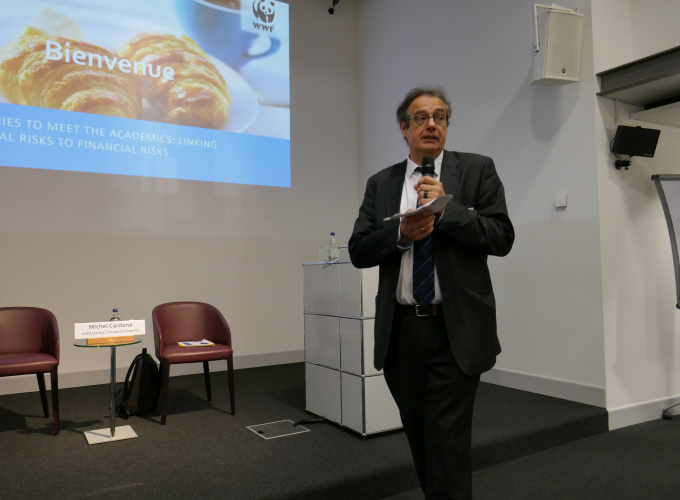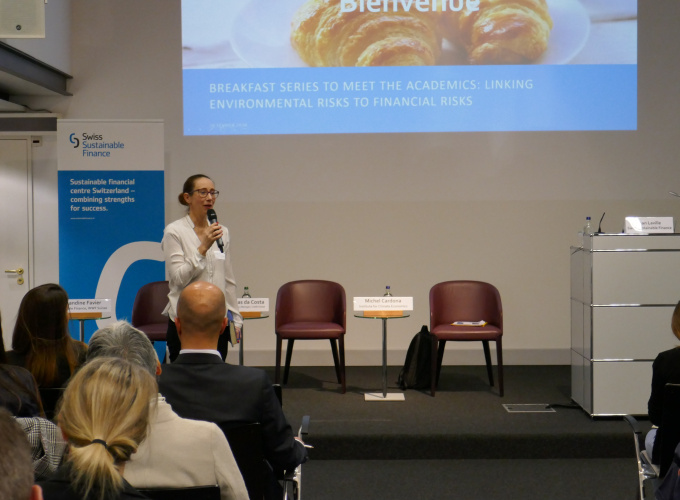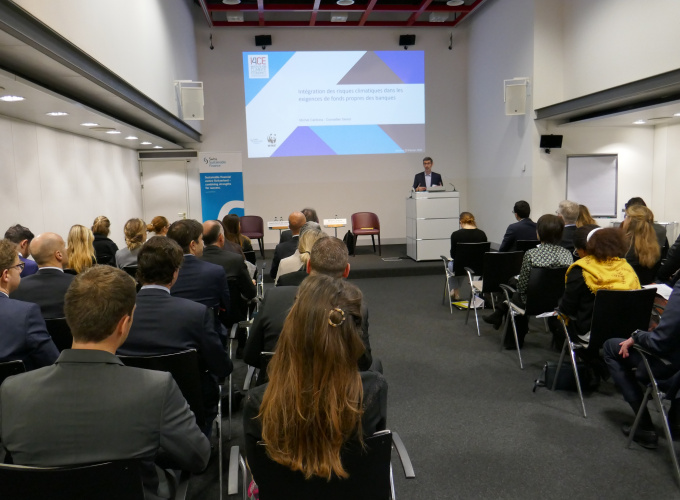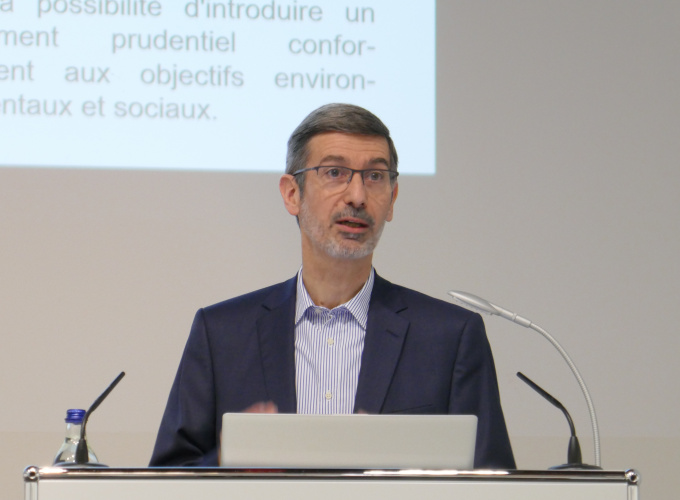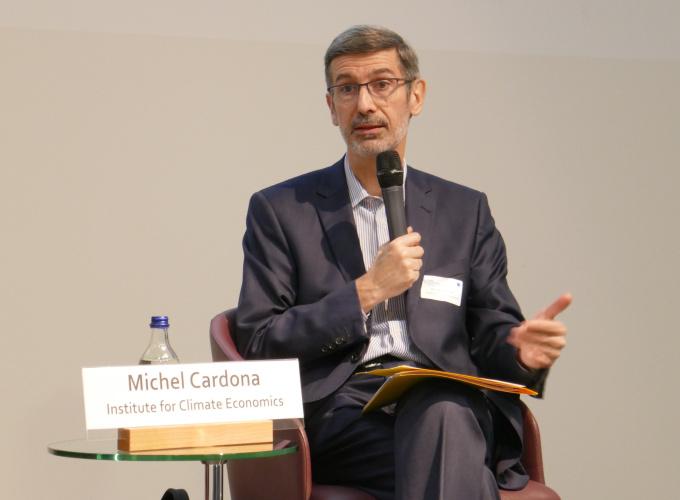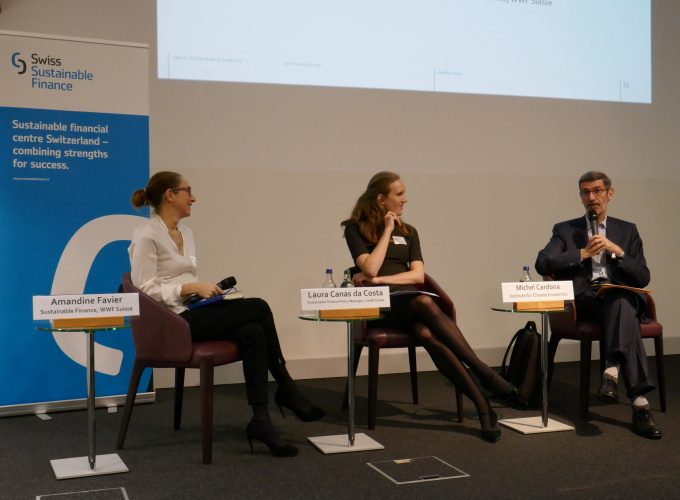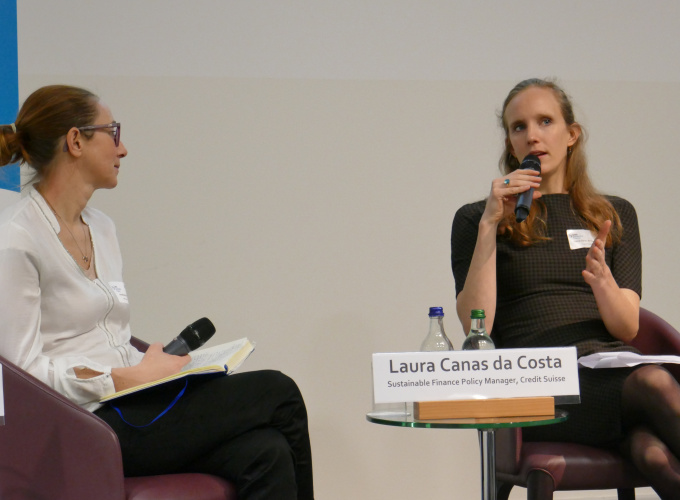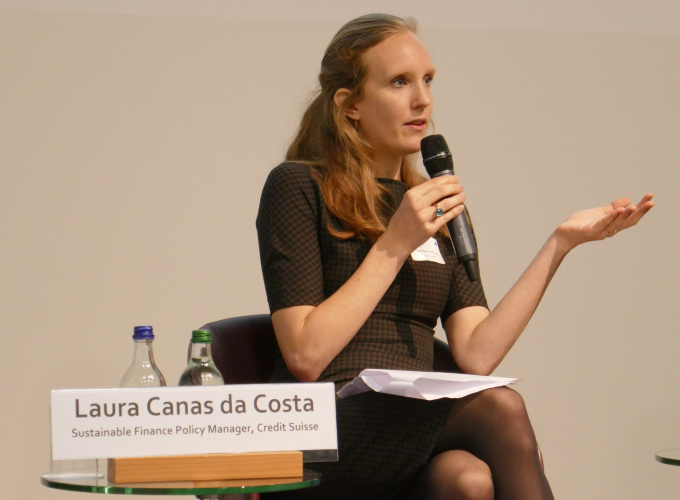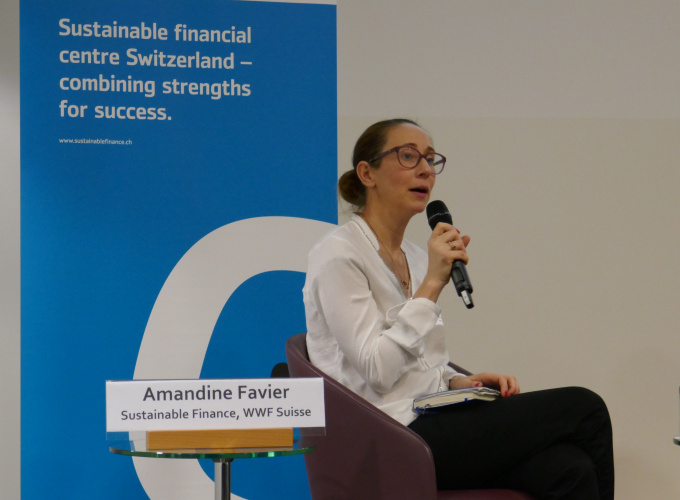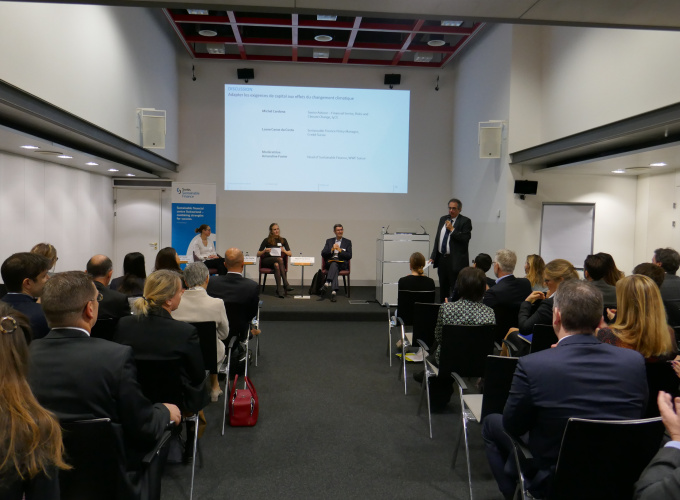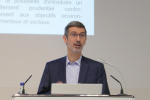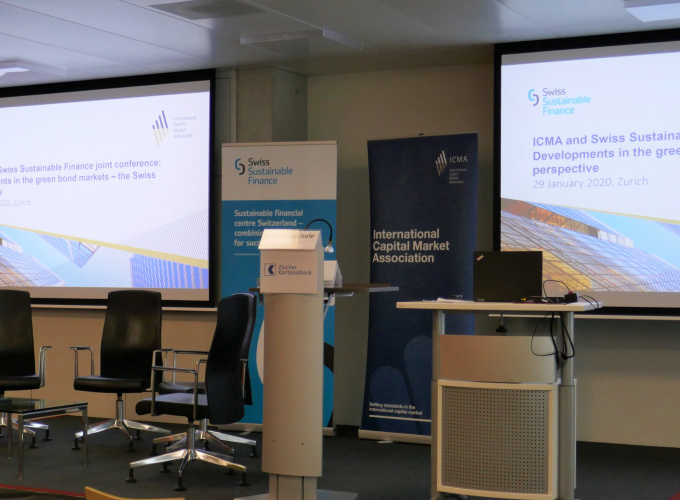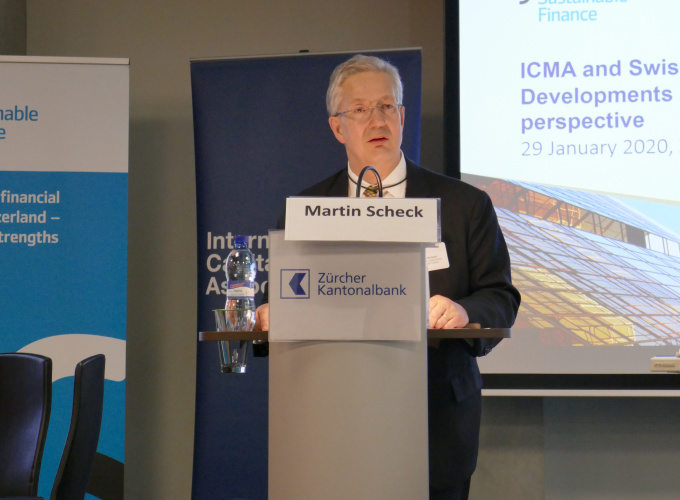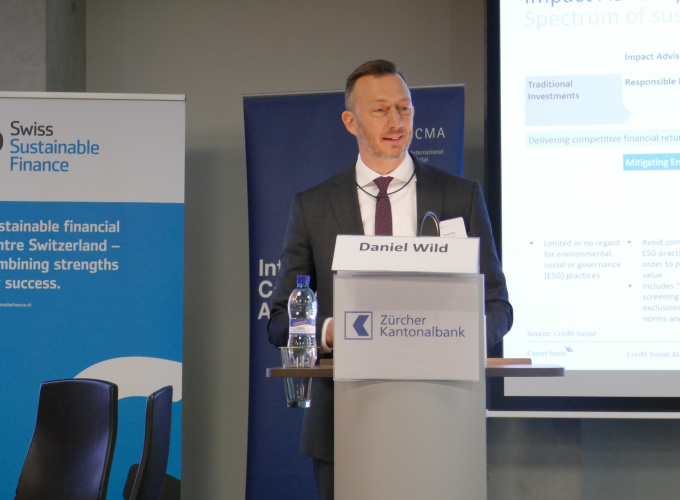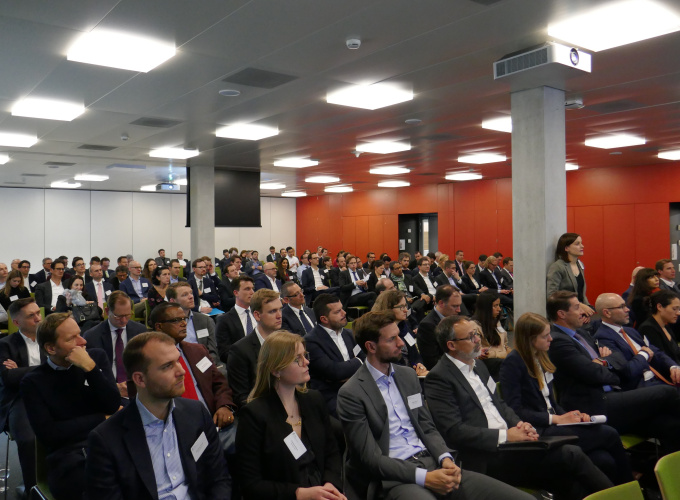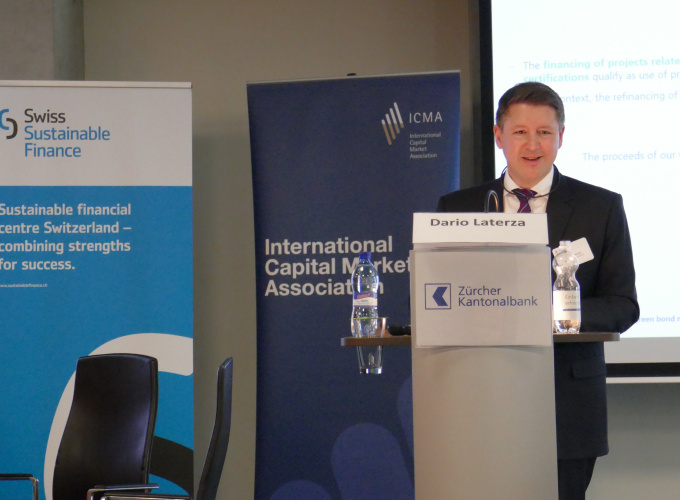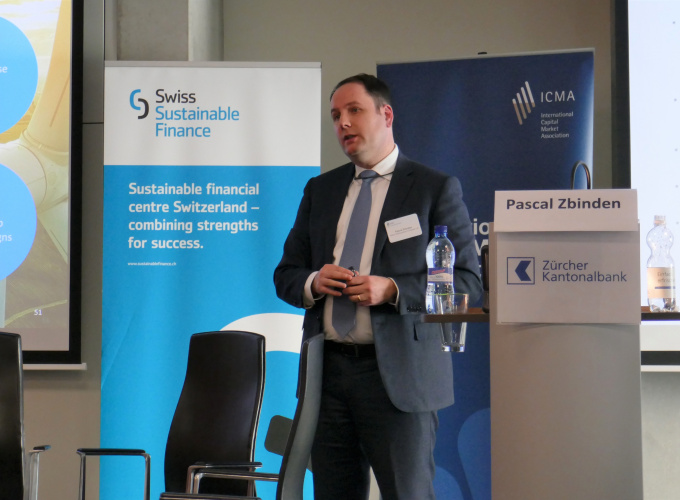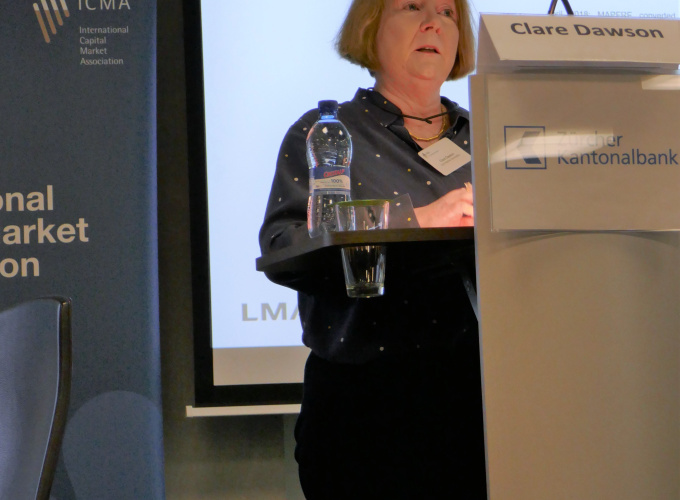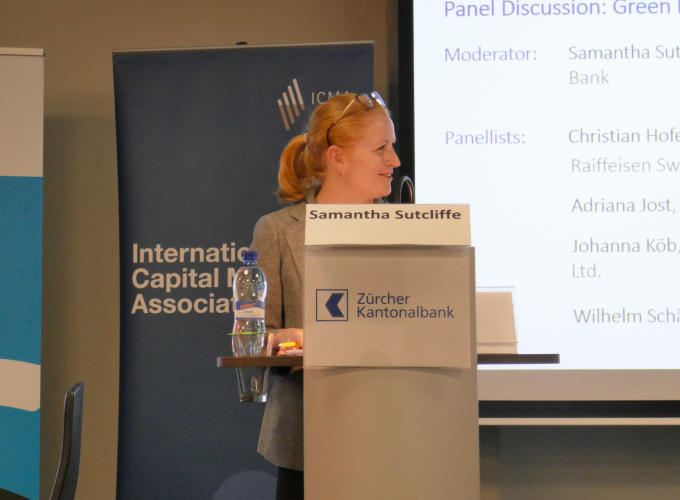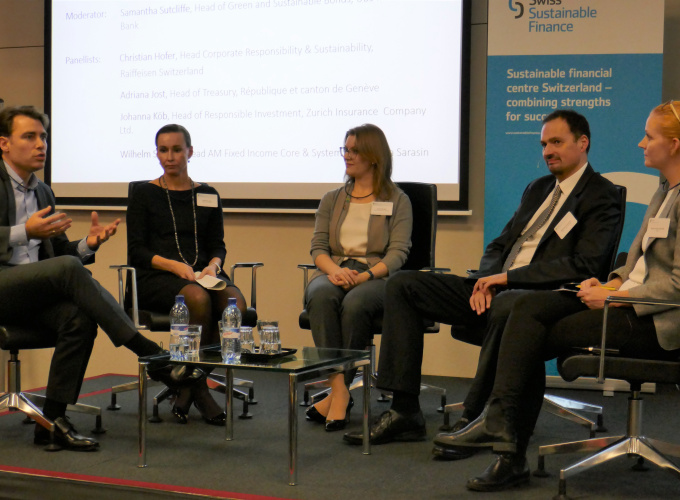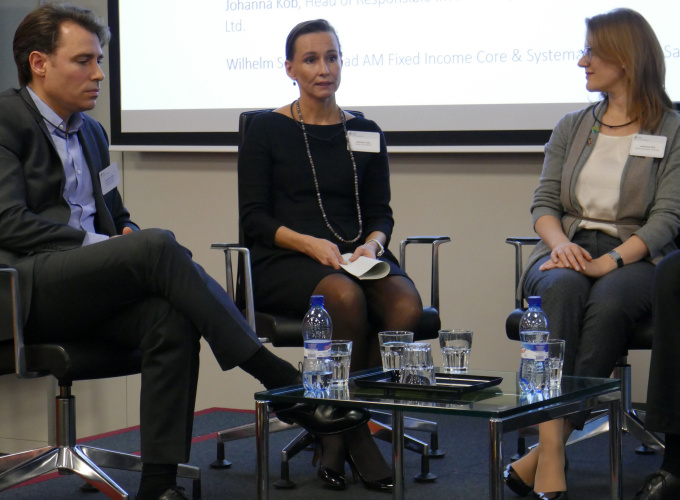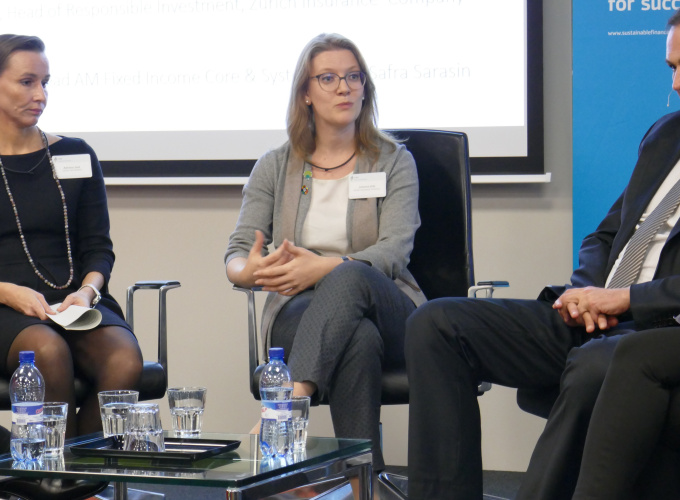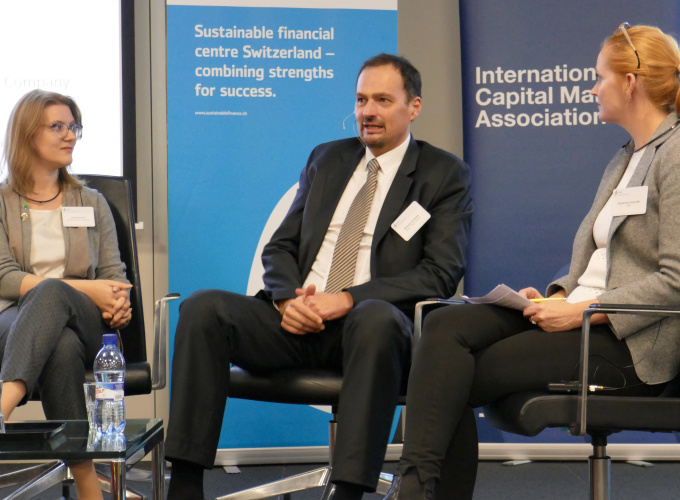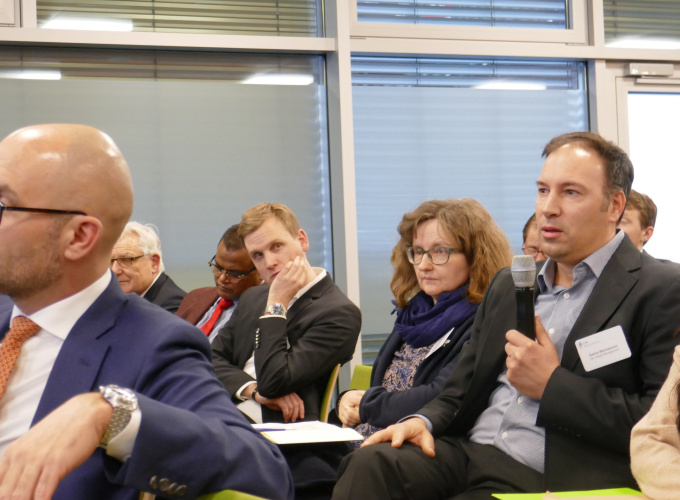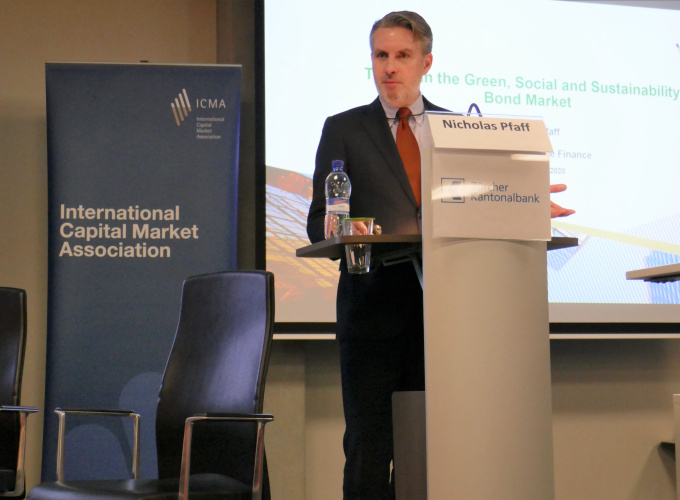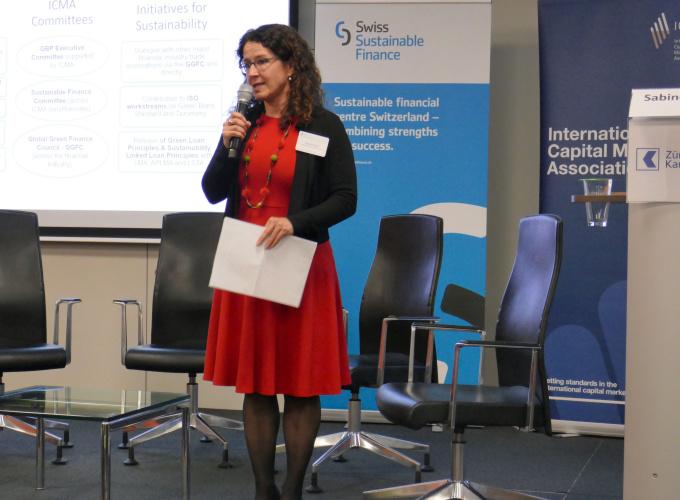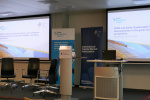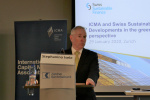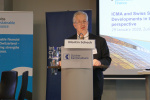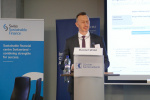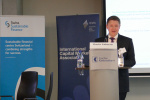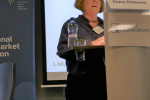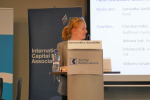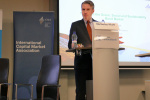Past SSF Events 2020
Sustainable Finance Disclosures Regulation (SFDR) Requirements: How to deliver it by March 2021
SSF, in collaboration with ECOFACT, hosted a webinar for members and network partners on the upcoming requirements of the Sustainable Finance Disclosures Regulation (SFDR). Find more information about this webinar in the members section of the SSF website.
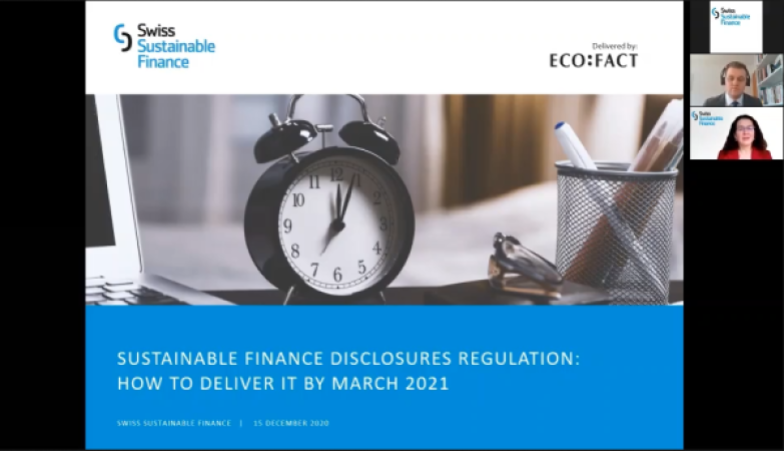
Financing the Low-Carbon Economy
Webinar, 19 November 2020
To mark the launch of its report «Financing the Low-Carbon Economy», SSF held a webinar to share insights and bring influential voices to the table for discussions. Over 250 webinar participants joined us live to hear from the SSF team and key representatives from the financial industry and academia on how the financial sector can help contribute to a low-carbon world.
Sabine Döbeli (CEO, SSF) opened the webinar, followed by Anja Bodenmann (Project Manager, SSF) providing a brief summary to the report content. Anja explained the motivations behind the report, mainly that SSF aims to shed more light onto instruments and mechanisms, both mature and in development, which can support the transition to a low-carbon economy and help keep global temperature increases to well below 2°C, as stipulated by the Paris Agreement. After a brief presentation of the topics covered in the report and SSF key take-aways, Sabine opened the floor for the inputs by the expert panel.
Jörg Gasser (CEO, SwissBanking) emphasized the importance of the Swiss financial industry, which controls over one quarter of all cross border wealth management. He outlined that for most of the major banking business lines, sustainable solutions are already at hand, but insisted that for some of the instruments to thrive, improved framework conditions still need to be achieved.
Urs Arbter (Deputy CEO and Divisional Head of Insurance Strategy and Regulation, Swiss Insurance Association) then gave more background on how the insurance industry in Switzerland has been ramping up its efforts for a more sustainable world. He cited the development of concrete tools by private insurers and the SIA in the field of climate adaptation, such as a hazard map. Yet, he also emphasized the need for a balance between the right level of regulation and deregulation to help optimise framework conditions.
Finally, the academic viewpoint was brought in by Bjarne Steffen (Senior Researcher and Lecturer, Energy Politics Group, ETH Zurich), who noted the explosion of low-carbon financial policies around the world over the last few years. On a country level, Switzerland has shown a relatively low level of policy activity, which could lead to a decrease in the attractiveness of Switzerland for sustainable solutions, and also make it more difficult to scale up financial instruments for a low-carbon economy.
The webinar closed after addressing many critical questions from participants.
Sustainable Finance Trends in Switzerland & Hong Kong: 2020 and Beyond
Webinar, 29 September 2020
Jointly with the Consulate General of Switzerland in Hong Kong and Sustainable Finance initiative Hong Kong (SFi), Swiss Sustainable Finance (SSF) held a public webinar on the sustainable finance industry landscapes in Hong Kong and in Switzerland.
After Deputy Consul Katia Stampfli-Ferraz (Consulate General of Switzerland in Hong Kong) welcomed the over 120 participants to the webinar, Sabine Döbeli (CEO, SSF) gave an overview of the latest development in the Swiss sustainable investment market. Leonie Kelly-Farley (Partner, Sustainable Finance initiative) then provided insights into the current setting and scope of sustainable finance in Hong Kong. Both presentations also highlighted private investor perspectives and the latest regulatory developments in Switzerland and Hong Kong.
The questions during the Q&A that followed touched upon trends in impact investing in the NGO space, prevailing concerns regarding lower financial returns in sustainable investments and how to address this, as well as the geographic foci of sustainable investments and comparisons of the Hong Kong financial centre to other centres in Asia. Although sustainable finance underwent different trajectories in Hong Kong and Switzerland in the past, it became clear from the discussions that looking forward, sustainability is key priority for financial industry players and regulators both in Switzerland and Hong Kong.
Finanza sostenibile, la piazza ticinese è pronta?
Webinar, 23 September 2020
On 23 September, Ticino for Finance, in collaboration with Swiss Sustainable Finance (SSF), organized a public webinar in Italian on sustainable finance and its relevance for the Ticino financial market place. After Franco Citterio (President of Ticino for Finance) welcomed the over 50 participants to the webinar, Alberto Stival (SSF Ticino Representative) gave an overview of the latest development in the Swiss market.
During the round table discussion that followed, market experts Roberto Mastromarchi (Banca Popolare di Sondrio (SUISSE), Simone Malnati (Banca del Sempione) and Walter Lisetto (Axion Swiss Bank, part of Gruppo BancoStato) – all SSF members – as well as Fabio Poma (WWM Group) gave their perspectives on sustainable finance. While the speakers illustrated their different experiences with sustainable investing, they all highlighted the importance and benefits of properly integrating ESG aspects.
Throughout the discussion, it became clear that in order to further promote sustainable investments and remain at the forefront in a fast-changing environment, public and private players all across Switzerland need to intensify their efforts. The webinar showed that in Ticino, there is a strong network of actors ready to further support sustainable finance.
>Download Alberto Stival's presentation
Evaluating climate risk assessment tools
member Webinar, 10 September 2020
At this fourth and final WWF/SSF event in a series to “meet the academics”, a webinar was held to present the final paper commissioned by WWF Switzerland on “Evaluating climate risk assessment tools”. Sabine Döbeli (Swiss Sustainable Finance) and Ivo Mugglin (WWF Switzerland) welcomed the 80 participants to the virtual breakfast event. Afterwards, Julia Bingler (ETH Zürich) co-author of the working paper “Taming the Green Swan: How to improve climate-related financial risk assessment” presented the main findings.
In the paper, the authors looked at 16 available climate transition tools based on a set of 11 criteria from three dimensions (accountability, depth of risk analysis and usability). Some of the main conclusions presented were that, currently available tools are robust but cover mostly publically traded assets, tools are already advanced and use different climate change scenarios as inputs, and many tools already offer users output which can be linked to in-house balance sheet based models. Julia closed with some recommendations for the further development of usable tools.
Short inputs were then given by Stefan Gross (FINMA) and Andy Howard (Schroders) to get insights from both the regulatory and practitioner perspective on climate-risk data usage.
FINMA is currently engaging with industry players to look at their approaches to climate-related financial risk and the measurement of the risks. From a supervisory point of view, Mr. Gross discussed some challenges and limitations with current methodologies, but also encouraged market players to engage with the ones most relevant for their activities. In an effort to tackle these issues, the Network for Greening the Financial System (NGFS), of which both FINMA and SNB are members, recently published research on the topic. Stefan Gross also pointed out that FINMA is working on ideas to clarify how the financial industry should approach disclosure on climate-related risks.
Andy Howard then provided a practitioner perspective on how investors are applying the knowledge they have on climate risks to their investment portfolios and future strategies. The consensus is that climate change will have unavoidable, disruptive effects on investments. To fully understand the implications, practitioners should be focusing on trends related to regulation, technology, fossil fuel phase out and potential physical risks. Using Value at Risk (VaR) models and currently available data and assumptions, Schroders has estimated that global equity valuations could suffer a loss of 10-20%. Andy Howard emphasised the challenge for practitioners is looking beyond pure emissions data and trying to find ways to better integrate forward looking data and more complex all-encompassing models.
The webinar closed on a positive note, with Julia Bingler stating that the currently available data is of high quality and practitioners should get started, as these tools can only improve with more users and more feedback.
>Download the full academic paper
>Watch input presentation of Julia Bingler
>Watch input presentation of Andy Howard
>NGFS publication: Overview of environmental risk analysis by financial institutions
Launch of Swiss Sustainable Investment Market Study 2020
Webinar, 8 June 2020
On 8 June, Swiss Sustainable Finance (SSF) published the Swiss Sustainable Investment Market Study 2020 and launched the publication during a live Webinar. After two welcome notes by SSF President, Jean-Daniel Gerber and Falko Paetzold (Managing Director, CSP, University of Zurich), the SSF team presented the main results of the 2020 study. Kelly Hess (Director Projects, SSF) outlined the details of the 62% market growth seen for Swiss sustainable investments in 2019 and shed light on some of the new quality analyses integrated in the study. Jean Laville (Deputy CEO, SSF) followed with insights into questions around aligning investments with climate considerations and market opinions. Finally, Anja Bodenmann (Project Manager, SSF) highlighted recent regulatory developments in Switzerland an abroad.
The webinar, which attracted over 300 viewers, was moderated by Sabine Döbeli (CEO, SSF), who gave a final summary and fielded questions from the audience after the presentations.
WWF & SSF event series to meet the academics - Adapting capital requirements to the effects of climate change
Geneva, 20 February 2020
The third edition of the WWF & SSF breakfast event series took place in Geneva, with 50 participants present to learn more about “Adapting capital requirements to the effects of climate change”. After Jean Laville (Swiss Sustainable Finance) and Amandine Favier (WWF Switzerland) welcomed the attendees, Michel Cardona (Institute for Climate Economics - I4CE) presented the results of his upcoming paper entitled “Integrating Climate-related Risks into Banks’ Capital Requirements”. The necessity for research on the topic arose in light of discussions by supervisors, but also among banks wanting to become active on a voluntary basis, about using a Green Supporting Factor (GFP) or Brown Penalising Factor (BPF) to address both the climate investment gap and climate-related risks. The recent debate has often been rather confusing, given that two different approaches with different objectives are at stake; a risk approach that aims to ensure financial stability and an economic policy approach, which aims to channel financial flows towards a low-carbon economy. What the authors at the I4CE found in their review of the instruments was that depending on the underlying approach, multiple challenges arise for both a GSF and BPF. They also highlighted that supervisors seeking to pursue a risk and economic policy approach simultaneously will face considerable tensions.
In the following discussion moderated by Amandine Favier, Laura Canas da Costa (Credit Suisse) joined Michel Cardona to discuss what these findings mean for policy makers and market players. In light of the EU’s upcoming second package of measures on sustainable finance, Michel Cardona stated that, while he would recommend supervisors analyse the prudential needs, employing GSP or BPF instruments requires careful considerations – implementing such factors based on risk perspective in particular still has considerable shortcomings. Practitioner Laura Canas da Costa highlighted what Credit Suisse has undertaken to look into risks, focusing on TCFD and internal analysis of key sectors. While identifying and measuring climate risks is thus crucial for the bank, some doubts were raised whether prudential requirements are the right instrument. A specific problem mentioned was that a GSF or BPF could discourage financing for firms transitioning to more sustainable business practices, depending on the classifications chosen. In addition, these prudential instruments may have limited effects, if companies seeking funding simply revert to other forms of financing.
During closing remarks speakers agreed that an encompassing Basel IV that takes into account climate effects would be helpful. However, at the moment policymakers and market players need to assess and evaluate different options and instruments. The speakers and participants continued discussions during the following networking coffee.
ICMA and SSF joint conference: Developments in the green bond markets – the Swiss perspective
Zurich, 29 january 2020
Over 150 delegates joined SSF and the International Capital market Association (ICMA) for a half-day conference to discuss the developments in the green bond markets from a Swiss perspective. After opening remarks from the conference host Stephanino Isele (Head Institutionals & Multinationals, ZKB) and Martin Scheck (Chief Executive, ICMA), insightful presentations were given by various Swiss actors active in the green bond space.
Daniel Wild (Global head of ESG Strategy, Credit Suisse) set the stage with figures of the growing market for the currently available types of green bonds (Entity based bonds, Proceed-based bonds and behaviour-based sustainability linked bonds). He also pointed out that there is a growing market for bonds from sectors and companies which normally are excluded from the green bond market (i.e. Brown companies), but could contribute considerably to meeting climate goals should they transition to greener practices.
Two case studies were presented from both the issuer and investor perspective. From the issuer side, Dario Laterza (Head of Funding, Treasury, ZKB), explained how ZKB overcame challenges when launching their green bond in 2018, used to refinance existing and future ZKB environmental loans. For ZKB an important step was the third party verification process, which was not always trivial due to the use of Swiss energy efficient building standards that had to be translated into international norms. From the investor perspective, Pascal Zbinden (Co-Head SAA & Markets, Swiss Re) presented how Swiss Re evaluated and ultimately chose to invest in green bonds as part of their impact investments, with the added benefit that the draw down linked to green bonds is often lower than for corresponding non-green bonds. He emphasized that investors need to be aware that there are many “shades of green” and must choose their investments based on their own targets, and that transitions bonds should not be ignored as they will likely play a big role in helping us reach our climate targets.
After refreshments, delegates were presented with another perspective by Clare Dawson (Chief Executive, Loan Market Association). She presented the efforts of the Loan Market Association, with close exchange with ICMA, to launch Green Loan Principles adapted for elements such as revolving credit facilities.
The following panel discussion, moderated by Samantha Sutcliffe (Head of Green and Sustainable Bonds, UBS) brought together four more Swiss voices active in the green bond field. Christian Hofer (Head Corporate Responsibility & Sustainability, Raiffeisen Switzerland), Adriana Jost (Head of Treasury, République et canton de Genève), Johanna Köb (Head of Responsible Investment, Zurich Insurance) and Wilhelm Schäfer (Head AM Fixed Income Core & Systematic, J. Safra Sarasin) discussed the issues around why Switzerland is lagging when it comes to green bond issuance. Particularly interesting was the pioneering spirit of Adriana Jost, who explained how the Canton of Geneva became the first Swiss public entity to issue a green bond for energy efficient buildings in 2017, following up in 2019 with another one to finance rail infrastructure. All panellists agreed that investors and potential issuers should be building up their capacities to meet the increasing demand for green bonds.
Closing the conference was Nicholas Pfaff (Secretary of the Green Bond Principles and the Social Bond Principles, ICMA) adding comments about the international green bond market and Sabine Döbeli (CEO, SSF) wrapping up the key points of the afternoon.
>Download ICMA presentation (Nicholas Pfaff)





